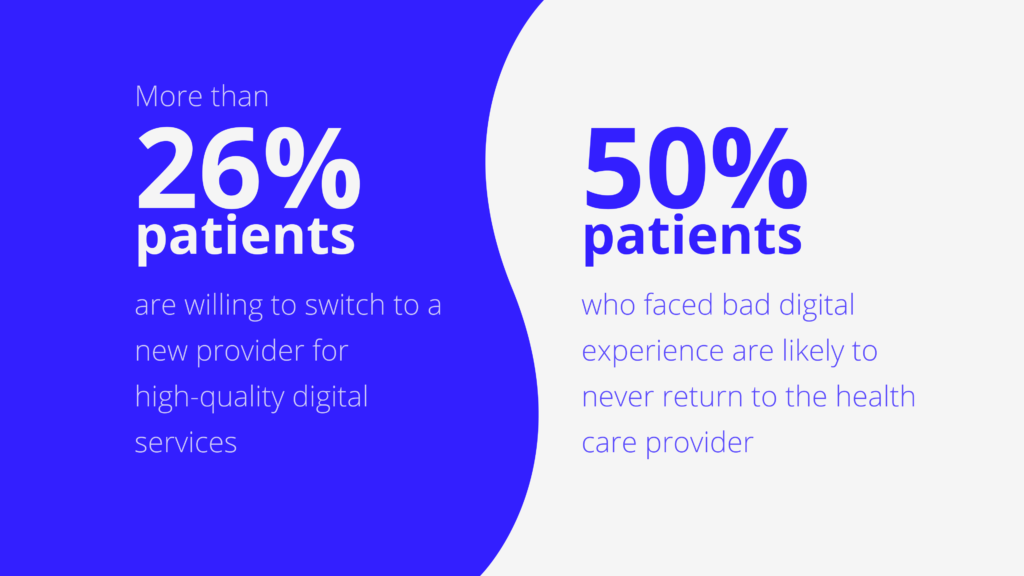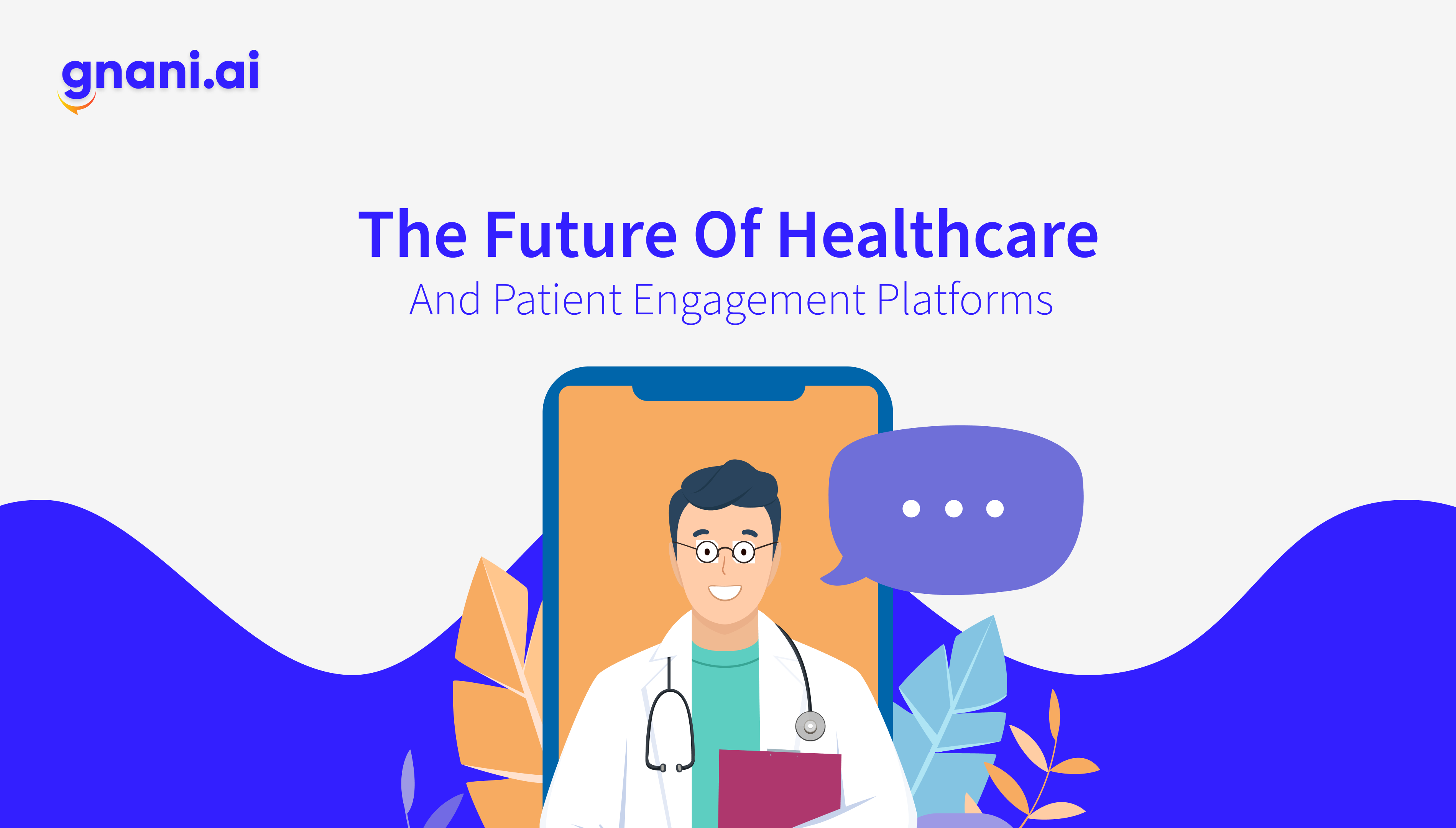The current pandemic has not only affected businesses negatively but also fast-forwarded technology adoption. It has compelled us to learn how to embrace technology to deliver a better customer experience.
The healthcare industry has always been a quick adopter of the latest technologies to save lives and improve the patient experience. AI and Robotics, in particular, have taken the medical field to the next level. With smart wearables and remote patient monitoring, healthcare professionals can treat their patients easily and monitor their vitals closely.
Patient engagement platform has come up with a drastic change in gathering both functional and actionable patient health information that improves the patient experience, and reduces costs for patients and healthcare care providers. It provides a path involving patients in their care and transforms health systems into a patient-centric model.The evolution of patient engagement platforms has allowed healthcare professionals to deliver a more holistic experience and satisfaction.
Let’s dive deeper and understand the importance of the patient engagement platforms and see how AI is driving its growth.
Patient Engagement Platform In Healthcare – A Boon

Patient engagement platform in healthcare practice – a boon
Many healthcare providers are working hard to help deliver a patient-centric approach to health-related communication. Today, patients can access and share their electronic health information and medical data from their wearables, have a detailed discussion of their health by fixing an appointment with the doctors and do a lot more with patient engagement platforms and medical data management software. Patient engagement platforms activate the patients to become partners in their healthcare. When the patients become engaged, they can improve their health literacy effortlessly. It empowers them to assist in the healthcare plan and decision-making process.
With the patient engagement platform, you can:
- Share e-prescription
- Send a summary care
- Provide patient access for better communication
- Online/text message scheduling
- Pre-appointment planning
- Excel in terms of service by meeting patients’ needs upon demand, increased communication, and using data driven decisions.
Patient engagement platforms and software solutions act as a communication bridge between the healthcare providers and the patients. Since patients can reach their care providers via communication channels such as phone, text, and emails, healthcare providers can easily involve patients in their health management discussions. As a result, healthcare providers can finally offer the medical service and satisfaction that the patient wants.
Increased patient satisfaction through patient engagement technology
Patient engagement platforms save time and money by letting the patients book appointments and manage their health information through the online portal, thereby leading to better patient satisfaction.
A 2014 survey reveals that nine out of thirteen patients shared that they had a positive experience and health outcomes because of the helpful communication, easy appointment-scheduling, fast information management and higher engagement rate.
Healthcare providers who practice using software solutions as patient engagement platforms also state that patients tend to stick to the same medical solution provider who is using the patient engagement platform for practice by 2.6 times.
Since the patient engagement platforms provide a more streamlined experience in terms of communication, patient engagement and document management, doctors who practice can provide a more personalised data management experience and patient satisfaction.
What do people expect from patient engagement technology
One important challenge multi-location healthcare service providers faced before was incomplete information such as patient history. If the patient has moved from a healthcare provider in Location A to the healthcare provider in Location B, some of the files and medical data cannot be accessed. This increased the risk that doctors who practice won’t know the complete medical history and health information of the patient.
A recent Digital Health Consumer Survey by Accenture reveals that 39% believe a good digital interaction via software has a major influence on the patient experience. More than a quarter (26%) are even willing to switch to a new solutions provider for high-quality digital software services. Most importantly, 50% of the surveyed people have stated that a bad digital practice or experience with a healthcare provider ruins the entire experience and is never likely to return to the healthcare provider due to the poor satisfaction.
From the Accenture survey, we can understand that patients are more willing to get into the digital health service. The only thing a patient worries about is the quality of the software solution and health data security.

The power of AI in leveraging technology for patient engagement platforms
Nowadays patients expect to receive answers to their questions and connect with their healthcare teams as soon as possible. Integrating more frequent touch points for patient communication is inevitable for streamlined communication.
Conversational AI with Natural Language Processing (NLP) responds to patient queries quickly in a more empathetic manner to deliver meaningful interactions. Nonclinical practice and activities which are taken care of by the medical professionals can now be managed by Conversational AI and software.
Many industries are using AI voice bots for the management of inbound customer calls. This practice is almost similar in the healthcare industry as well. When a patient calls a healthcare centre for an appointment, the conversational AI bot can help the patient in the management of every stage of the booking process and let them fix a date at their convenience. Plus, the Conversational AI bots help in updating the calendar so that we also know the upcoming schedules.
Conversational AI bots and software are a lot more capable than manually booking appointments. They have the potential to completely reinvent the patient engagement platforms through proper information solutions and helpful data.
We will be covering the Conversation AI use cases for patient engagement platforms in the second part of this post. So bookmark our blog and stay tuned.
Frequently Asked Questions
How can the practice of artificial intelligence change the healthcare and medical information management industry in the coming future?
Artificial intelligence is being used in the healthcare industry for several different purposes. From diagnosing diseases to helping doctors make decisions, AI solutions have proven to be an important tool for medical professionals.
What is patient engagement technology?
Patient engagement technology is a health information management software solution platform that helps hospitals and clinics store data to better engage with their patients. The system can be used to schedule appointments, answer patient questions, send reminders about upcoming visits, and more such communication purposes.
Why is patient engagement important in healthcare?
Patient engagement is important because it helps to improve patient satisfaction and ensures proper management of patient communication. The more patients are engaged, the happier they are with their care. When patients are satisfied with their healthcare experience, they’re more likely to recommend your facility to others and come back for future visits and health appointments.



How Voice Biometrics In Healthcare Is Improving Data Privacy & Protection
[…] get numerous signatures, and manually schedule since voice biometrics can easily integrate with conversational AI bots. Both validation and data filling can happen […]